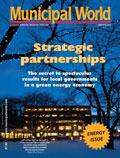P.G. Featured in Municipal World
Tuesday, January 10, 2012 @ 3:53 AM
 Prince George, B.C.- The City of Prince George has reason to pat itself on the back.
Prince George, B.C.- The City of Prince George has reason to pat itself on the back.It is the cover story for the magazine “Municipal World” which is distributed to 47,000 mayors and councillors across Canada.
Unlike some of the other recent media attention caused by high crime stats, this article about Prince George is all positive.
Why the national attention?
It’s all about a four page article written by Councillor Garth Frizzell on the City’s bio-energy efforts.
“We began discussing the bioenergy projects in Prince George last summer at the Annual General Meeting of the Federation of Canadian Municipalities. In getting the details for the story I was writing, it really became clear what a significant moment Prince George has reached. Municipal World really got it.” says Frizzell.
The article explains how bioenergy has become a viable energy option because of a variety of factors including new technology and global politics which emphasize energy security.
Through local efforts and partnerships, Prince George has adopted initiatives that have placed the city at the forefront of the bioenergy industry, including:
- UNBC’s newly proposed bioenergy expansion which will host the most comprehensive bioenergy demonstration site in Canada.
- UNBC’s bioenergy plant’s biomass gasification project that tied with Harvard for the top campus sustainability project in North America in 2010.
- The Canfor Pulp Cogeneration facility which helps Canfor remain the largest producer of bioenergy in North America.
- The City of Prince George’s District Energy System which will provide heat to downtown businesses, improve air quality and reduce greenhouse gas emissions.
The praise doesn’t just come from the article written by a local councillor, the magazine ‘s editorial also lauds Prince George for its efforts.

Comments
Nice to see positive aspect portraide of Prince George for a change.
“and reduce greenhouse gas emissions”
Theres the money maker.
My bio energy project consists of 16″ long, 6″ round, birchbark covered bio energy sticks which burn nicely in an air tight stove. Lets hear it for all other politically correct buzz words also. My carbon footprint is a size 12 DDD.
Just one foot?
Bio Energy is a farce. With all the electricity that we produce in BC all these buildings etc; should run on electricity. Instead we sell the power to the USA who use it for running their air conditioners in the summer. What a bloody waste of power.
If you compare all your bio enegry projects to electricity then you are a net polluter.
Furthermore. We should be supplying schools, hospitals, universities, etc; with very cheap or free, electrical power. Instead we pay to build the dams, to produce the electricity, then we build the power lines, then we supply the power to Government entities, and then we are taxed again to pay for the power that these entities use. In other words, we pay for it twice. We are being royally screwed in BC.
People talk about thinking outside the box. In my opinion the next time they think outside the box will be the first time.
Palopu wrote: “We should be supplying schools, hospitals, universities, etc; with very cheap or free, electrical power. Instead we pay to build the dams, to produce the electricity, then we build the power lines, then we supply the power to Government entities, and then we are taxed again to pay for the power that these entities use. In other words, we pay for it twice”
So let’s do the math.
If the government facilities got free electricity, let us see what that would look like if 15% of production were to be supplied free and the private sector would have to pay for that 15%.
To make up the difference, the private sector would have to pay 18% more for their electricity use.
With an 80/20 split it would become 25% more.
Either pay through two systems or one, we end up paying for it in the end. The distribution may be slightly different between corporate and individual home owner, but the total remains essentially the same.
Bio-energy ( wood burning ) is a fools errand, it is low density energy that can only exist with government subsidies which raise the cost of power. Palopu is partly correct, we produce very cheap power or did until the fiberals screwed it up. For a better explanation read this. One caveat cheap mass storage hydro has been left out because this article is about Britan which has very little hydro power, mainly thermal. But is still a very good explanation. Gus read this- http://www.ingenia.org.uk/ingenia/articles.aspx?index=740
Comments for this article are closed.